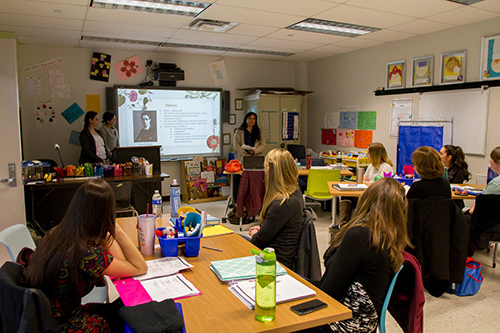May
Thirsty for a Strong Instructional Practice?
Take a SIP of this: using skills-based syllabi to develop transferable outcomes.
May 3, 2018
 SIP 6.15 Skills-based Syllabi
SIP 6.15 Skills-based Syllabi
Thirsty for a Strong Instructional Practice?
Regardless of the topic or level of the course – intro-level general studies or upper-division requirement for the major – we have all heard our students ask, “Why do I have to take this class?” While this may be annoying, the “translation” might inspire a bit of empathy: When students ask “why,” they are generally wondering what skills this class is giving them that will be applicable to their post-graduation plans for work or further study. How can we better connect in-class work with our students’ post-graduation goals and dreams?
Try this: Skills-based Syllabi
A skills-based syllabus is conceptually focused on the behavioral changes that you wish to produce in your students. These changes are intended to produce measurable learning outcomes that prepare students for professional or post-graduate educational experiences. In addition, highlighting the skills that a student learns in your class will allow them to understand the concept of learning outcomes and how they relate to skill transferability – that the skills they master in a history class, for example, may be applicable when they study math for their business degree.
Try these tips for reorganizing your syllabi to highlight the skills students will gain from your class:
- Identify three to five skills that you want your students to learn. These may coincide with the student learning outcomes of your course, and that’s OK. But keep in mind that an “outcome” can be less engaging to students and may not seem as immediately applicable to their career or further study as a “skill.” Skills may include the obvious, such as public speaking, or they may be more esoteric depending on the course, such as teaching, leadership, staff development or community organizing.
- Create a simple graphic organizer, such as a table or chart, and create one space for each skill. Then, go through your syllabus and put each content topic and activity listed into one of the skills spots. You may even choose to color-code the table and then use that color throughout the rest of your syllabus or course materials to indicate connection to a particular skill.
- Integrate the skills you are fostering into the activities and work products of the course in a meaningful fashion. For example, engage students in a post-assessment that asks about the activity/test/project/etc. and about the activity itself. Some questions you might ask: “How did this activity encourage the development of leadership skills?” and “How were your leadership skills enhanced by doing this activity? Give examples.” This type of assessment will validate students’ development of skills and will allow them to learn how to talk about how their work in class has prepared them for professional work at a job interview, for example.
- Encourage your students to keep track of their skills development in an e-portfolio system such as Portfolium – coming soon to MSU Denver for incoming first-time-to-college students (later to be scaled to all MSU Denver students). Students can then share their e-portfolio with potential employers and, regardless of their prior work experience, speak meaningfully about the skills they can bring to the new position. For info on Portfolium please contact Elizabeth Parmelee, director of Undergraduate Studies, at eparmel1@msudenver.edu.
- Also encourage your students to develop a LinkedIn page (or similar). This will help them to build their professional presence on the web and can also contribute to the development of their résumé or curriculum vitae when the time is right.
Still Thirsty? Take another SIP of Skills-based Syllabi
For related information on how to create a learner-centered syllabus, check out SIP 2.14 at The Well.
Frischmann, R.M. (2013). A Skills-Based Approach to Developing a Career
Encourage your students to visit MSU Denver Career Services on campus early and often. The talented staff there can help students to further develop presentation of their skill sets and foster career readiness. In addition, Career Services offers a LinkedIn workshop for students in the fall, and it performs continuous reviews of LinkedIn profiles and résumés by appointment.
Visit The Well at http://sites.msudenver.edu/sips/ for more great ideas and resources for Strong Instructional Practices in your higher-education classroom.
